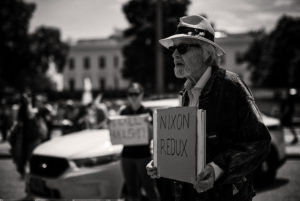
White House protest the day after FBI Director James Comey was fired
After a disastrous week for Donald Trump and his White House, with ever-changing stories about Trump’s firing of FBI Director James Comey, Trump tweeted on Friday that he may discontinue White House daily press briefings. This follows a series of disturbing incidents exhibiting shabby Trump administration treatment of the national news media, including:
- Banning The New York Times, the Los Angeles Times, CNN, Politico, BuzzFeed, the BBC and the Guardian from press briefings.
- Ejecting Andrea Mitchell of NBC News from State Department events where she tried to ask questions.
- Repeatedly referring to the mainstream news media as “fake news” whenever they report on real stories that are unflattering to the Trump administration, especially the investigations of Russian interference in the 2016 U.S. elections.
- Having a reporter arrested after he asked questions at Health and Human Services Secretary Tom Price at the West Virginia state Capitol.
- Cutting off veteran reporter April Ryan, who is a black woman, and telling her, “stop shaking your head” while she was asking a question in the White House Press Room.
The relationship between Trump and the press, as we first noticed last February, has grown so contentious that Trump even skipped the annual White House Correspondents Dinner, a typically jovial event at which the president gets to crack jokes about the media to their faces, and a hired comedian gets to make fun of everyone. The pattern of avoiding unfriendly audiences repeated itself on Thursday, when Trump canceled a scheduled visit to the FBI after being told that his firing of Director Comey would result in a cold FBI reception.
The White House has been in such a bunker mentality especially since the firing of Comey that Trump’s Press Secretary Sean Spicer actually hid in the bushes on the White House grounds Tuesday night when reporters started asking questions. As we say in politics, “bad optics.”
The thing is, when a president cannot get along with the press, it’s usually the president who suffers more than the press. Richard Nixon learned this first-hand. Nixon’s unhinged rant against reporters after losing the 1962 California Governor’s race sent him out of elected politics for six years, and set a sour, mistrusting tone with the press that would come back to haunt Nixon during Watergate, leading to Nixon’s impeachment and resignation.
In Trump’s case, if he cancels the daily White House press briefing, or allows his Press Secretary to hide in the bushes again, a narrative will set in about Trump and his staff literally and symbolically running away from the media. In parlance Trump would understand, this would look weak. Moreover, the White House daily press briefing is where a president’s spokesperson tries to set the daily agenda and message, and speak the administration’s talking points in person. It’s not likely to be as effective merely to send out press releases by email, text, fax Twitter or otherwise, which has been an additional practice for years anyway.
As President Bill Clinton‘s Press Secretary Mike McCurry said, “the modern presidency cannot work effectively if it is constantly at war with the media.” 2008 Republican presidential nominee and long-time Senator John McCain seems to know this. During his election campaign, he famously threw the press a barbecue at one of his homes in Arizona. Reportedly, McCain even jokingly refers to the media as his “base.” While McCain could not overcome a number of disadvantages and win the 2008 election, he did receive lots of good press, which continues to this day, including plenty of invites to the Sunday morning TV news interview programs.
In short, the U.S. press is protected by our Constitution, and they’re going to be around a lot longer than any one president. While it already may be too late, if Donald Trump wants to have any chance to save his presidency, perhaps it’s time to put away the long knives towards the press, and take out the barbeque tongs.
Photo by Mike Maguire, used under Creative Commons license. https://is.gd/f4mFAh


